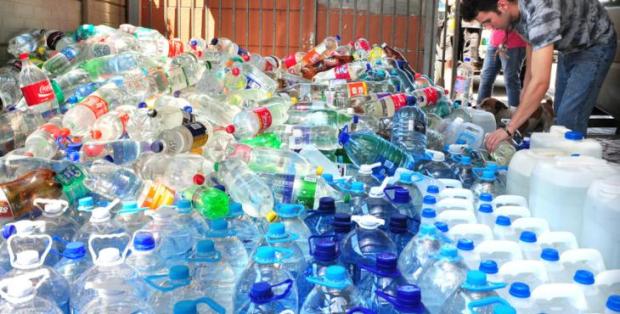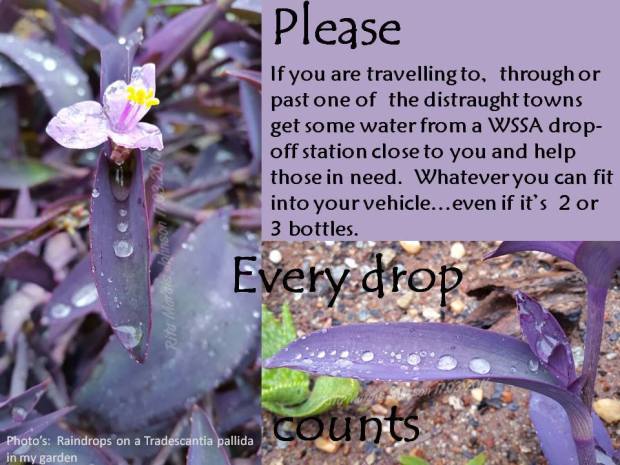Our bodies are made up of +/- 70% water and we need water to survive. Due to the recent drought in South Africa, water has become scarce to a point that it has become a luxury for many communities and provinces. Individuals, groups of people and private companies are joining hands in efforts to collect water bottles for distribution in areas which are in desperate need. Initiatives such as the Water Shortage South Africa (WSSA) are one of many initiatives started and supported by fellow South Africans. WSSA does not only need water bottles, but help can be offered in the form of letting more people know about the initiative via social media by raising awareness of the drought problem that South Africa is faced with. Organisations such as LeadSA and Gift of the Givers have also joined in to help.
Seen below is a volunteer of WSSA, Andre le Roux, going an extra mile to help by storing some of the water collections at his home.
Since drought is an urgent issue which needs our attention, various articles have been consulted to address this issue, as well as to critically analysis what is happening in our country because of the drought. The articles consulted are from News24, Mail and Guardian and the SABC News. The sources consulted were used to gather further details regarding (1) who and what are the drivers for change; (2) what is happening; (3) what can be done (if appplicable/mentioned); (4) how to get it done and (5) what are the means to get it done. This information will be portrayed in a table:
Article Who and what are the What is happening?
drivers of change?
News24 (1) Department of Water The water scarcity and
and Sanitation; drought seems to be Fin24 (2) Circle of Blue decelerating, but with
(Choke Point) winter approaching, it
seems like South Africa
will be experiencing
problems due to dryness.
Mail & Guardian (3) Central Bank of The drought has affected farms. Swaziland Vegetation is not growing which means that there could be inflation, price hikes and a threat on food security.
What can be done How to get it done What are the means to do it
(if mentioned / (if applicable/ (if applicable/ mentioned)?
applicable)? mentioned)?
(1) Millions of rands have been spent to try relieve the problem and water tanks and fixing reservoirs throughout the country (R78M and R38M respectively.
(2) “Choke Point:
South Africa will report on the Medupi and Kusile power stations, and other facets of the competition for water, energy, and food in this drying nation”
– News24.
(3) -Help victims of the – Central Bank of drought. Swaziland.
-Offer support to the publicised that they farmers. would donate the equivalent of R1 million. -More donations from private companies as well as governments through- out the continent is required.
Holm, in his article, Humanities for the Environment—A Manifesto for Research and Action discusses two points, the “Great acceleration” and “The New Human Condition” amongst other points. These two points will be used to furthermore critically analyse the sources consulted for a deeper understanding of the topic of drought.
The “Great Acceleration” can be described as aspects such as power, money, consumption, technologies which have of the past 70 years that have been imperative mechanisms of Global Change which have in turn resulted in a complete change in environmental conditions (Holm 2015:980). In all three articles, the “Great Acceleration” is appealed to as there has indeed been a change in environmental conditions due to human efforts. Examples of this can be due to people having the resources to purchase water whenever they think it’s necessary and for whatever reason, without being accountable. We have the power through resources such as money to consume water as we wish, especially in areas in South Africa where water scarcity is not a problem. Due to power, yet again, we are able to do things with water, which are extremely unnecessary for our own selfish gain. An example of this would be people taking part in the ALS ice water challenge. This was a great initiative started for a good purpose(to raise funds), but people did not do it for the right reasons, thus resulting in water waste. The drought is not something which we can physically control, but through our actions and by means of political, institutional, cultural and societal factors, the situation South Africa is faced with at the moment could be better controlled. For example, the government should have implemented initiatives at an earlier stage to try to alleviate the problem of drought. People should have been educated and informed of what was to come beforehand, and programs and warnings should have been initiated beforehand too. Socially and culturally, families and communities should have, and should be, doing (done) more to try help the country with the problem. This could be done through efforts such as informing their families of the importance of water and its conservation, as well as telling the members of ways to save water.
In his article Holms also discusses “The New Human Condition” which is essentially how we react to situations o the environment which are presented to us. The Department of Water and Sanitation decided to put in millions of rands in efforts to improve the situation by supplying water tanks and filters as well as by providing money for drought relief. Personnel within the Department are constantly researching and their findings depict that although the drought crisis is getting better as the days go by, winter is going to be a bit difficult for some communities due to the lack of rain over the past few months (New24, 2016). According to the article by Keith Schneider, although the country is already suffering economic strains, people will have to pay more for farm produce due to the drought. Actions taken are by organisations and the government providing help to farmers for irrigation purposes. Choke Point is one of the front runners as they state in the article that “South Africa is the next chapter in our global reporting to understand how nations are responding to the 21st- century environmental shape-shifting that is changing patterns of rainfall and snowmelt, affecting supplies of water, energy, and food, and bullying economies on every continent (News24,2016). In the article from Mail and Guardian, the Central Bank of Swaziland has pledged to donate money to help those that are affected by the drought (Mail and Guardian, 2016).

The proposed solutions do engage with the business/corporate sector. Many organisations have started to raise awareness of the problem at hand and have taken further steps to get water for places which are in need. Organisations such as Gift of the Givers, Water Shortage South Africa and LeadSA have been motivating people to do their bit because every litre helps. Private companies have also joined in to help and an example of this would be First National Battery, who recently went to deliver 15 000 litres of water to a community in Bloemfontein. Pick ‘n Pay has also got a place where people can leave their donations of water. In the articles,Circle of Blue through their Choke Point initiative, have also undertaken to take action by educating the masses through the knowledge that they have.

The proposed solutions and means to do it do stem from collaborative processes of research, stakeholder engagement and public participation. This is seen by the response that has been seen from the public as well as from companies and organisations. Without collaborative processes, it was going to be a challenge to help as many victims as possible. It is good to take note of the fact, that people did not leave the problem in the hands of government alone, but rather opted to help in one way or another.
The solutions are definitely being translated into practical means that can easily be achieved by the public, for the most part. More still needs to be done in this regard and more people need to participate for a great impact,but the practical means are clearly evident and helpful, especially to the victims of the drought.
Drought is not a problem which is going to end now as can been seen by the change in weather patterns and climate change. It is essential that every one of us do our bit. It can be donating a bottle of water, raising awareness and educating the masses, or it could be in the form of donating money in aid of the drought. It is up to you, the next person and myself to preserve water and help those who are in dire need.
Critical questions we need to ask ourselves is: “How much is South Africa willing to invest in drinking water supply and waste water treatment networks that have been poorly maintained” (News24,2016). How willing are we to contribute to a positive change too?
Sources consulted:
Mthalane, V., 2016. News24. [Online]
Available at: http://www.news24.com/SouthAfrica/Local/South-Coast-Fever/water-limitations-likely-to-continue-20160323-3
[Accessed 1 April 2016].
N.a, 2016. Your Neighbourhood. [Online]
Available at: http://yourneighbourhood.co.za/be-a-hero-save-and-donate-water/
[Accessed 27 March 2016].
Schneider, K., 2016. News24. [Online]
Available at: http://www.fin24.com/Opinion/drought-pushes-south-africa-to-water-energy-and-food-reckoning-20160124
[Accessed 27 March 2016].
Steyn, L., 2016. Mail and Guardian. [Online]
Available at: http://mg.co.za/article/2016-01-14-droughts-devastating-ripple-effect
[Accessed 29 March 2016].
